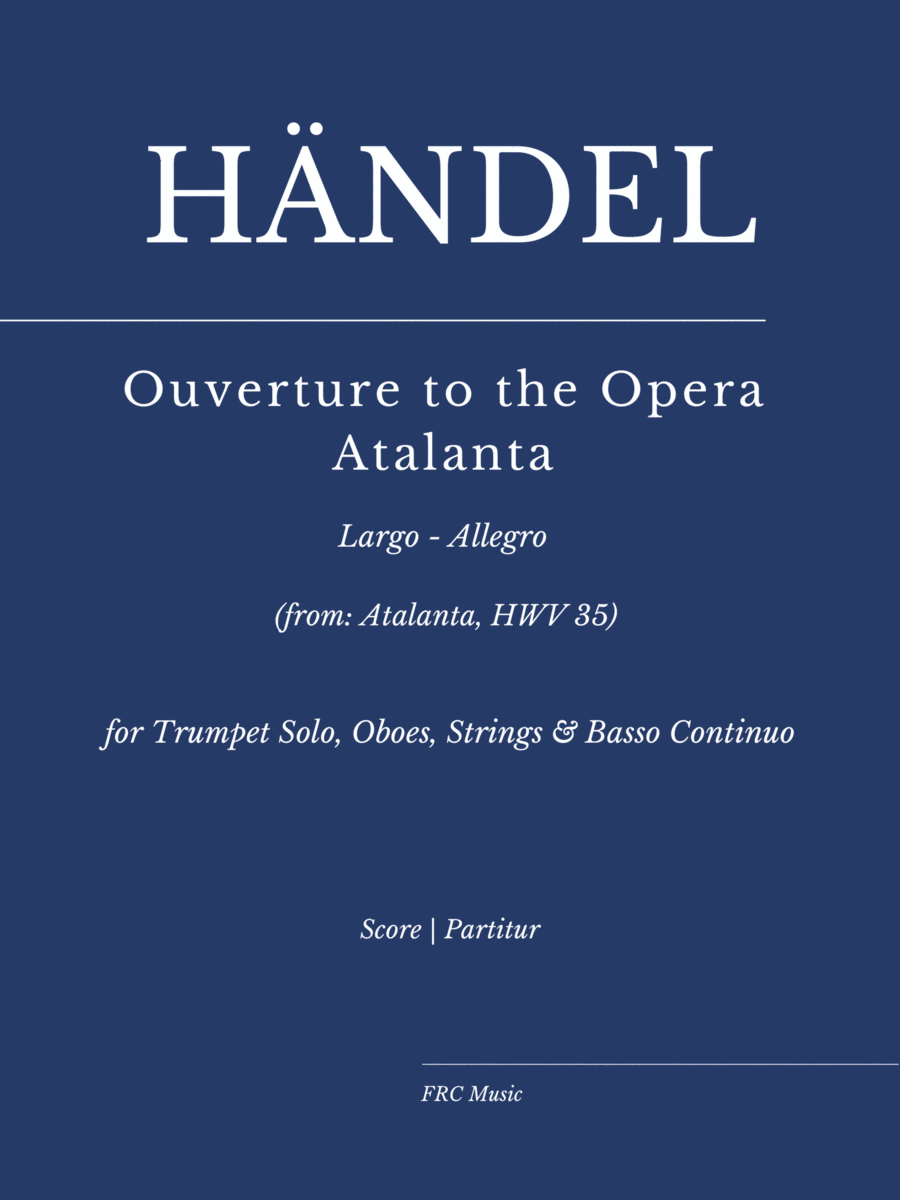Chamber Orchestra - Level 4 - Digital Download SKU: A0.1288408 By Georg Friedrich Händel, Alison Balson, Trevor Pinnock and the English Concert. By George Frideric Handel. Arranged by Flavio Regis Cunha. Baroque,Classical,Contest,Festival,Instructional,Wedding. Score and Parts. 44 pages. Flavio Regis Cunha #879394. Published by Flavio Regis Cunha (A0.1288408). Handel: Atalanta, HWV 35: Ouverture. Largo - Allegro.Do you want to bring Georg Friedrich Händel's Atalanta to life? Introducing Handel's powerful work for trumpet solo and chamber orchestra, as played by the world's premier soloist Alison Balson and Trevor Pinnock. Perfect for church, school and professional orchestras, 'Handel: Atalanta' will give your performance exceptional energy and dynamic expression. Get this timeless masterpiece and experience a stunning work of genius.Advanced Intermediate Format: Concert, 9 x 12 inches44 pagesFull Score and Orchestral Parts Instrumentation: Basso continuo, Trumpet, Chamber Orchestra (0.2.0.1  0.1.0.0  harpsich. str.) + Trumpet and Continuo reductionDuration: 4 min.Program NotesAbout the ComposerThe 'Atalanta, HWV 35: Ouverture' was composed by the renowned Baroque composer, Georg Friedrich Händel. His imaginative works make him one of the most important figures of the Baroque period. Other well-known works of Händel's include 'The Messiah', 'Water Music', and 'Music for the Royal Fireworks'. He was a master at combining various instruments and emotional elements to create enthralling music.Musical CharacteristicsThe 'Atalanta, HWV 35: Ouverture' is characterized as a light and airy composition, made up of a combination of a trumpet solo and chamber orchestra. The movement transitions from a gentle, unhurried 'Largo' into an energetic and lively 'Allegro'. The bright, steady tempo of the 'Allegro' creates a lively and captivating atmosphere. The trumpet solo and chamber orchestra complement each other wonderfully, resulting in an energetic and joyous musical journey. The Composition ItselfThe 'Atalanta, HWV 35: Ouverture' is presented here by trumpeter Alison Balson and conductor Trevor Pinnock and The English Concert. The piece begins with a wonderfully flavorful 'Largo' section, featuring Balson's ethereal, small touches of the trumpet as the orchestra gently sets the musical groundwork. This is soon followed by an equally uplifting 'Allegro'. Balson's trumpet solo is full of passion and energy, creating a bold and energetic atmosphere. As the chamber orchestra grows more intense, the piece builds to a thrilling conclusion. Programmatic InterpretationThe 'Atalanta, HWV 35: Ouverture' is based on the ancient Greek myth of Atalanta. In the myth, Atalanta is a swift and brave Princess who is challenged by a band of young suitors to a race. To the winners, she offers a prize of marriage. As we listen to Handel's composition, we can imagine the race beginning with the slow and steady 'Largo', as Atalanta calmly assesses the present, and takes her time to decide her path. As the 'Allegro' begins, we can feel her strength and power as she embarks on her journey, full of excitement and determination. As the piece builds, we can feel her courage and enthusiasm as she confronts the race ahead. Finally, we can picture Atalanta achieving success as the piece ends in jubilation.About the album 'Magic Trumpet'Sound the Trumpet is an album of glorious baroque music associated with royalty where Alison brings the music of the Purcell and Händel to life. collaboration between the English trumpetist, Alison Balson, the conductor and harpsichordist, Trevor Pinnock and the English Concert baroque soloists.
